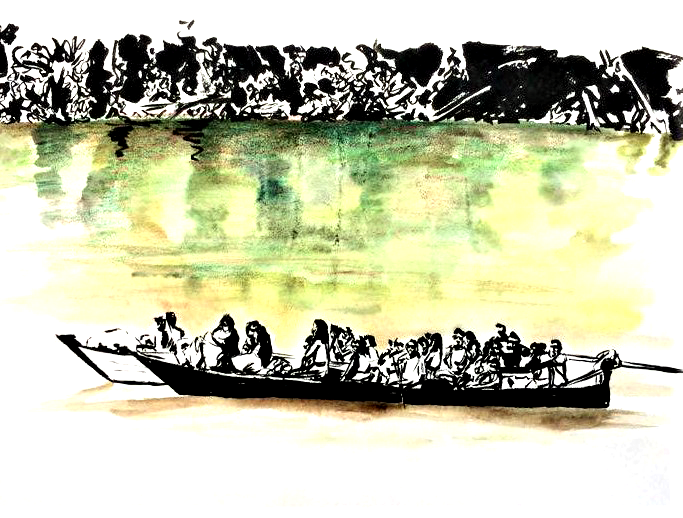
Last year, I went to a friend’s house in Nantes. We watched a zapping (editing different video sequences to recreate meaning), and inside there were excerpts from a TED talks (international conferences around given topics). The man speaking was Daniel Everett, a former missionary who went to the Amazon to convert Indian tribes to Catholicism in the 1980s. He lived and documented for many years the language and way of life of a tribe in particular: the pirahãs.
The tribe now numbers around 1,000 nationals. They are monolingual and intend to remain so: they have a very strong resistance to any form of assimilation and reject foreign cultures. They have no belief system, no God, or even words to express this concept. So, when Everett tells them about the Bible and Jesus for the purpose of evangelizing them, they think he’s talking to them from personal experience. When he says that God created the stars and everything else, the pirahãs don’t believe him, thinking that it was not created by anyone and that it was already there. One day that Everett was talking about Jesus, a pirahã asked him:
“Hey Dan, what does Jesus look like? Is he dark like us or light like you?
-Well, I’ve actually never seen him, he lived a long time ago, but I do have his words.
-Well Dan, how do you have his words if you have never heard him or seen him?”
They made it clear that if he had actually not seen this guy they weren’t interested in any story about him. This is because the pirahãs believe only in what they see. Religion seems to them an unnecessary and superfluous constraint.
And yet, although atheists, they were the happiest people Everett had ever seen. Faced with this observation, he himself began to doubt his own faith, eventually becoming an atheist in 1982.
If the pirahãs have difficulty in conceptualizing the events presented in the Bible, it is also because they do not have the appropriate vocabulary to talk about a distant past or future. As Everett will say:
« The pirahãs only make statements that are anchored to the moment when they are speaking rather than to any other point in time”. The relation to the time of the pirahãs is consistent with the grammatical peculiarities of the language: for example, they have a suffix to say that they have witnessed what they say. They have no words for a great-grandparent and are unable to make such word, simply because the life expectancy does not extend beyond the generation of grandparents. Moreover, they do not lexically distinguish the gender of the parents: “father” and “mother” is the same word: “baíxi”. They have the smallest lexical field in the world to refer to family. A word for parent then, a word for “son”, a word for “daughter”, a word for “orphan”, a word for “brother / sister”, and that’s it.
The phonology is also very particular. For example, French has 33 phonemes (this number decreases depending on the region), Croatian has 32. Pirahã (the language) has one of the smallest phonological systems in the world: barely 10 phonemes (3 vowels and 7 or 8 consonants). This figure varies because men and women do not use the same phonemes. For example, the “s” is reserved for men, while women use the “h” as a substitute. Another surprising fact is that they have no nasal consonant, like the “n” or the “m” which are one of the most common consonants in languages.
They do not distinguish the right from the left, nor the singular from the plural. Pirahã is one of the few languages in the world that does not have a number system. They ignore the concept of “counting”. This is consistent with their culture, because, as it is based on barter, an exchange is considered fair when both parties are satisfied.
In addition, they do not have a recursion system, which is the embedding of one sentence within another. “The man who thinks his wife said she was coming” would be in Piraha “The man has a wife. He thinks. The woman says: I am coming”. They do not distinguish colors, only dark or light shades. To refer to it, they make comparisons.
Their language adapts to their environment, so that while they do not necessarily have all the vocabulary of our European languages, they have a much larger vocabulary to qualify the flora and fauna of their environment. Nothing more normal, considering that they live there. And a language is nothing but the tool that allows you to describe your environment. For example, while the languages of our continent have feminine, masculine and / or neutral pronouns, Pirahas not only have feminine / masculine but also pronouns to qualify non-human non-aquatic subjects, non-human subjects, aquatic and inanimate subjects: 5 in total. Which is completely logical with their culture which is dependent on a river.

These are linguistic specificities among so many others which shattered a good number of universalist thesis, since the pirahãs did not fit into their box. Everett will only be able to stay in the tribe if he stops telling them about Jesus, and he will formalize his atheism in 2002, which will lead to a divorce from his wife, and other family complications.
In conclusion, he left to preach the good word, and in the end it was he who was converted. Doesn’t that make pirahãs the fanciest people on Earth?
You can find here the link to the TED talk, it’s very interesting and the guy is awesome: https://www.youtube.com/watch?v=get272FyNto
See you next time for some other amazing languages (:
Mathilde

